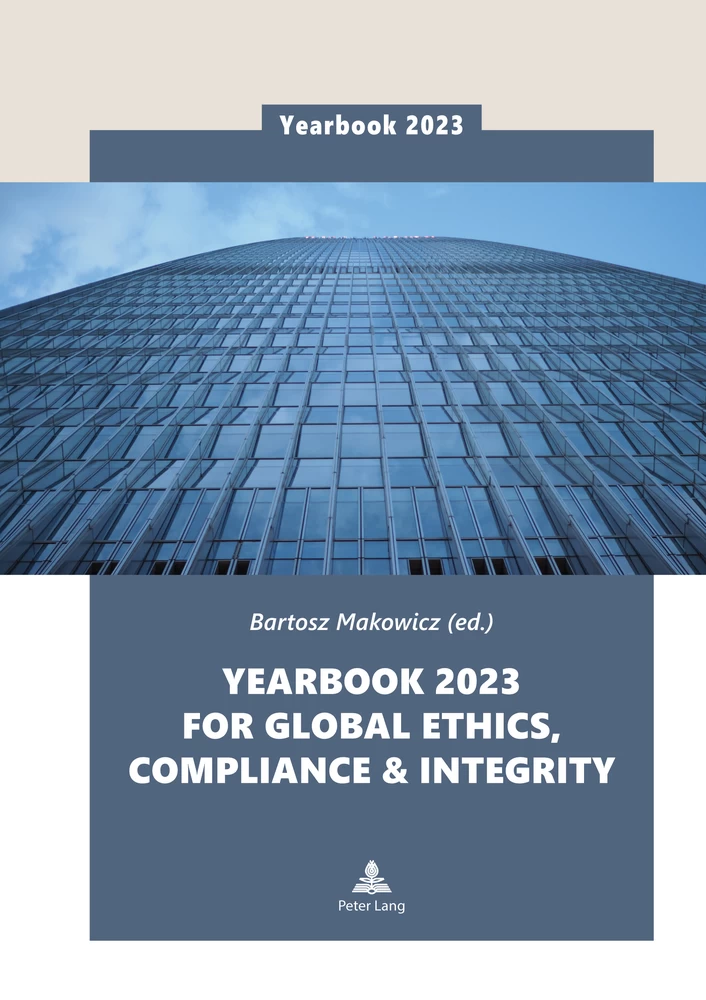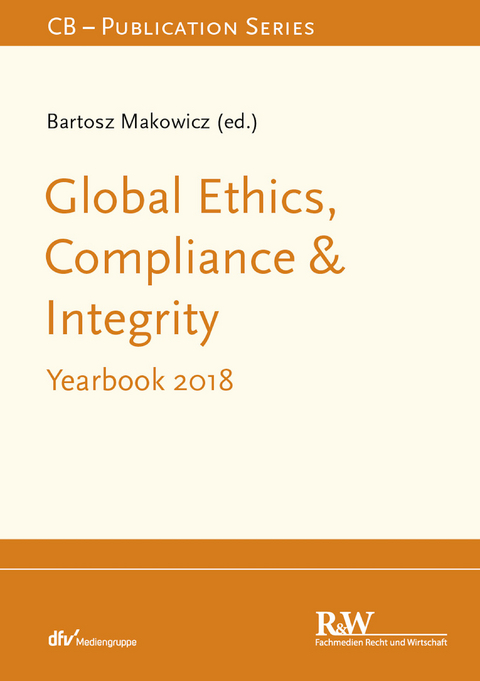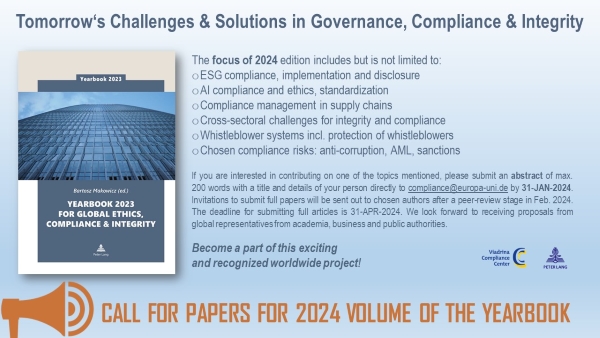Viadrina Compliance Center
Yearbook
The deadline for submitting the abstracts is end of January 2024!
IDEA
In 2018 the first edition of the Yearbook of Global Ethics, Compliance and Integrity focusing on “Cross Cultural Compliance” was published as the result of a number of projects, various discussions, conferences, workshops and international congresses on Ethics, Compliance and Integrity. At these events, industry representatives (usually chief compliance officers) repeatedly complained about the considerable challenges they faced when attempting to implement internationally uniform and reliable compliance management systems (CMS) within a global organization or group structure. Certainly, methods and standards on how to determine and manage risks in individual countries do exist. However, social and cultural borders or foreign culture and values may make it difficult to ensure not only compliance but also the integrity of all members of an organization / corporation. To give the practitioners from all over the world a deep and complex overwiev in only one publication we desiced to publish this work every year covering by that all recent, actuall and current developments, challenges and stretegies in Ethics, Compliance and Integrity! In 2021 and 2023 another Yearbooks followed.
ETHICS, COMPLIANCE AND INTEGRITY
Yet why is all this necessary? What does compliance have to do with values, ethics, culture and integrity? There is only one answer: everything! Human beings are at the center of any CMS along with their culture and underlying values. Human culture and values are formed by experiences, education, environment, religion and many other factors: these same values and culture determine whether a bribe has been accepted, environmental standards breached, interest rates manipulated or customers deceived. In all cases of non-compliance, values and the human culture therefore play a crucial role. In addition, human conduct
and the values directing it are the subject of ethics, a branch of philosophy. A CMS cannot function effectively without a sound understanding of ethics and thereby the values and culture that prevail in the area where it operates. Is it not enough then for people to internalise the culture and underlying values? No! They must also ensure that their outward acts consistently accord with these values. It is at this point that integrity comes into play. Compliance and integrity may therefore be regarded as two sides of the same coin, whereas ethics represents a specialist discipline within these two areas. This explains the first of the
two approaches in this work “Ethics, Compliance and Integrity”. The boundaries between these three terms are porous and complement each other.
The approach of this publication deals with challenges where the boundaries are somewhat clearer. Nowadays, when national economies are so closely interwoven, it would be wrong to adopt a single approach to Ethics, Compliance and Integrity; rather
developments should be viewed from a global perspective. Once a CMS has been implemented in one part of the organization or extended to a part located in a different culture, one must consider the differing ethical and moral rules, the culture and the values of its inhabitants. Otherwise, the system will be rejected and produce nothing more than undesirable side-effects, thereby resulting in attempts at evasion
We have therefore adopted in this book a rounded and self-contained concept which nevertheless retains a degree of flexibility. We will expand and update the work at regular intervals. We herewith invite interested authors and experts from the world of Ethics, Compliance and Integrity to submit their proposals for contributions. We will also ensure that similar works feature high-quality contributions in order to promote the development of Ethics, Compliance and Integrity in the long term.
CONTENT 2023
The 2023 Yearbook for Global Ethics, Compliance and Integrity appears in turbulent times. On the one hand, we have had the Covid19 pandemic, which has led to several lockdowns and long-lasting changes in our working world. Although it is continuing to prevail, it is no longer perceived in the same way as it was at the beginning. On the other hand, the Russian aggression against Ukraine we have witnessed since Febraury 2022 has led to political, economic and cultural consequences that will significantly and permanently change not only individual economies but the entire geopolitical landscape.
Organizations and their members, and thus compliance, ethics and integrity, are far from immune to these developments. On the contrary, multidimensional crises of this kind sometimes result in the legislator quickly adopting new and not always well thought-out rules which leads to new compliance risks. Another effect is that people suddenly feel that their livelihoods are threatened, thereby providing them with a justification to break the rules. It is therefore obvious that crises can pose an enormous challenge to ethics, compliance and integrity in organizations.
At the same time, the work of those specialising in ethics, compliance and integrity is growing in importance. It is therefore both an honor and pleasure to note that the 2023 edition has attracted a number of excellent authors, despite being created at a time of crisis! This year, dozens of propsoals were submitted, which we carefully curated and arranged into six sections: (I) New Approaches and Trends for Compliance Management Systems, (II) Practical Approaches to ESG, (III) Ethics and Integrity Challenges, (IV) Selected Current Compliance Risks, (V) Whistleblowing Management Systems and, last but not least, (VI) Compliance Management in Selected Types of Organizations.
I was also pleased to see that some submissions concerned highly innovative projects supported by the KBA NotaSys Integrity Fund. This is the same foundation that enabled us to produce this year’s edition of the Yearbook. I would like to thank the KBA NotaSys Integrity Fund for its kind support, as well as all the other people who have contributed to the creation of the 2023 Yearbook! Above all, I would like to thank all the authors who have shared their valuable knowledge, experience and skills and made this work possible.

More and purchase possibilities: https://www.peterlang.com/document/1376272
CONTENT 2021
The Yearbook 2021 for Global Ethics, Compliance & Integrity offers an uptodate overview of the recent and most significant developments in the interdisciplinary area of organizational Ethics, Compliance & Integrity Management. The 2021 Yearbook focuses on (but is not limited to) integrity and ethics and consists of 40 highly valuable articles submitted by 55 experts. The authors include excellent ethics, compliance and integrity professionals, scholars and advisors from 20 different countries.
As conceived, the publication offers exclusive insights both from practical and theoretical perspectives. This year’s edition consists of seven carefully arranged chapters dealing with governance and compliance management, integrity management, organizational ethics and culture, anti-bribery management, whistleblowing, the challenges of digitalization, and – last but not least – corporate incentives and sanctions. In each chapter, the yearbook provides a comprehensive range of views and expertise regarding Ethics, Compliance and Integrity in all kind of organizations.

More and purchase possibilities: https://www.peterlang.com/document/1114370
CONTENT 2018
Starting with this introduction (Chapter A), several contributions deal with the future of compliance (Chapter B). The main part of the book (Chapter C) inves tigates challenges in the fields of compliance and integrity which arise in respect of the cross-border implementation of CMS. We then focus on the most common risks for global compliance in the field of corruption (Chapter D). Despite sophisticated anti- corruption systems, the preventive instruments of international organizations and the efforts made by the international community in this field, corruption still remains a wide-ranging phenomenon in many states.
CMS standards (Chapter E), attempt to take account of cross-border differences and diverse cultures, on the one hand, and the efforts towards creating uniform solutions on the other. The last three chapters deal with more practical subjects: namely, the preferred methods of CMS (Chapter F), especially intercultural communication and whistle-blowing systems, which are heavily influenced by cultural aspects (Chapter G). The final chapter concerns Ethics, Compliance and Integrity in international trade (Chapter H).

More and purchase possibilities: https://www.lehmanns.de/shop/recht-steuern/46407124-9783800592210-global-ethics-compliance-amp-integrity




